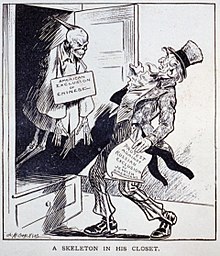Skeleton in the closet


Skeleton in the closet or skeleton in the cupboard is a colloquial phrase and idiom used to describe an undisclosed fact about someone which, if revealed, would damage perceptions of the person. It evokes the idea of someone having had a human corpse concealed in their home so long that all its flesh had decomposed to the bone. "Cupboard" may be used in British English instead of the American English word "closet". It is known to have been used as a phrase as early as at least November 1816.[1] It is listed in both the Oxford English Dictionary, and Webster's Dictionary, under the word "skeleton". The "Cambridge Academic Content Dictionary" lists it under this but also as a separate idiom. In the most derisive of usage, murder, or significant culpability in a years-old disappearance or non-understood event (a mystery), may be implied by the phrase.
See also
[edit]- Closeted, describing nondisclosure of sexual or gender identity
- Elephant in the room, an English metaphorical idiom for an obvious truth that is being ignored or goes unaddressed
- Milkshake Duck, an Internet meme describing someone becoming popular, only to be revealed to have a dubious history
- Nigger in the woodpile (archaic) means "some fact of considerable importance that is not disclosed—something suspicious or wrong"
- October surprise, unexpected revelations or discoveries during US presidential elections which can often alter the results of the following November election
References
[edit]- ^ The Eclectic Review, Volume 6, p. 468, at Google Books
